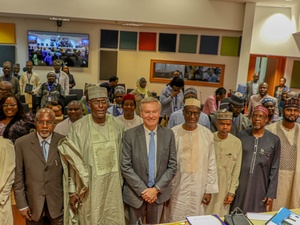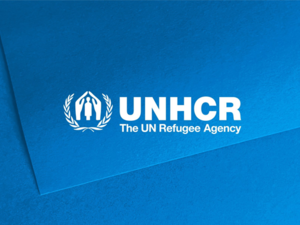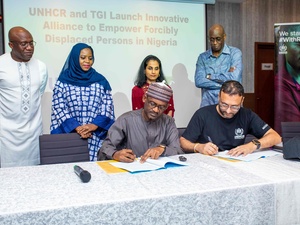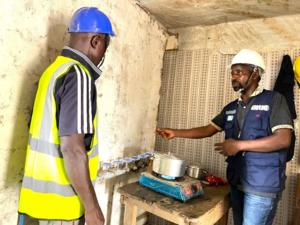Government, UNHCR, and partners step up humanitarian response for Cameroonian refugee influx into Nigeria’s Adamawa State

Government, UNHCR, and partners step up humanitarian response for Cameroonian refugee influx into Nigeria’s Adamawa State
Over 16,500 refugees from Cameroon's Southwest region have arrived in Adamawa State, Northeastern Nigeria, having escaped attacks by Non-State Armed Groups in the last six months. The UN Refugee Agency, UNHCR, is deeply concerned by the recent influx, as attacks on civilians, which cause displacement, are increasing in both frequency and violence on both sides of the border.
The Adamawa State Emergency Management Agency, the National Commission for Refugees, Migrants and IDPs, UNHCR, and partners have stepped up their efforts to provide life-saving assistance to the new arrivals. Some 11,800 individuals in Mubi, Michika, and Madagali, close to the border with Cameroon, have received core relief items comprised of blankets, mosquito nets, mats, jerry cans, and other essential sanitary and hygiene items, but more assistance is still required.
"We are on the ground and working with the Government and our partners to ensure these new arrivals have access to basic services, protection and receive lifesaving assistance," said UNHCR Representative in Nigeria Chansa Kapaya. "We, however, need additional resources to be able to respond effectively," she added.
Some US$ 2 million is required to respond to the most urgent needs of the new arrivals up to March 2023. Meanwhile, Of the US$98.2 million needed in 2023 to assist forcibly displaced communities in Nigeria, only 8% has been raised.
According to a recent multisectoral needs assessment, most refugees are children and adolescents, and they urgently need shelter, food, core relief items, and water, as well as access to essential services like healthcare and education. As of December 2022, less than 30 percent of these needs had been met.
These new arrivals are escaping violent attacks by active Non-State Armed Groups in Cameroon. They regularly launch devastating assaults on border communities, causing a constant influx of Cameroonians into relatively safer border areas of Nigeria. In the first two weeks of this year, the numbers sharply rose, with 2,900 new arrivals recorded.
This evolving situation is exacerbating the humanitarian situation in Nigeria's Northeast, where 2.2 million people are internally displaced. Excessive pressure on an already vulnerable host community necessitates interventions to promote social cohesion and peaceful coexistence. Efforts are being made to ensure that the needs of the host communities, internally displaced persons, and refugees are considered in an integrated manner.
For more information, please contact:
Gabriel Adeyemo – [email protected] +234 901 066 0496
Edward Ogolla – [email protected] +(234) 901 066 0511









